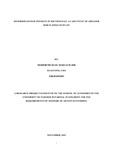| dc.description.abstract | The Government of South Sudan initiated different programmes to address poverty. These
programmes include the Interim Country Strategy Paper 2011-2013 which the government
adopted as an approach to fight poverty, the Institutional Capacity Building for Poverty
Reduction and Good Governance Project, Constituency Development Fund (CDF), Vision 2040
and international support to reduce poverty in the country. However, little has been achieved in
terms of improving the general welfare of the people in the country despite massive resources
directed to this young Nation. Therefore, the core objective of this study was to examine the
major factors which determine poverty through primary data collected from Greater Bor, in
Jonglei State in Southern Sudan. Binary Logistic regression model was used in estimation. The
following variables were considered: age of the head of the household, education levels,
employment status, gender of the head of the household, household size, household residence,
marital status, distance to the nearest health facility, sector of the economy, land ownership,
status of the road networks, access to safe water and access to credit facilities. It was revealed at
95% confidence interval that education levels, gender of the head of the household, marital status
and sector of economy employed significantly reduced the probability of being poor while age of
the head of the household, household size, distance to the nearest health facility and the poor
status of the road network significantly increased the probability of being poor. Based on the
study finding, it is suggested that the government should consider giving cash transfers to the
senior citizens who can no longer work to enable them acquire basic necessities to avoid
succumbing to the pool of poverty, creation of department specifically tracking the fertility rates
and creation of awareness on family planning issues to avoid large and unmanageable families,
establishment of health care facilities near the people to avoid long distance in an effort of
seeking health care thus avoiding losing working days through public private partnerships and
lastly, there is a need for improving all major roads which acts as market linkages including
feeder roads to ease accessibility and movements. | en_US |

